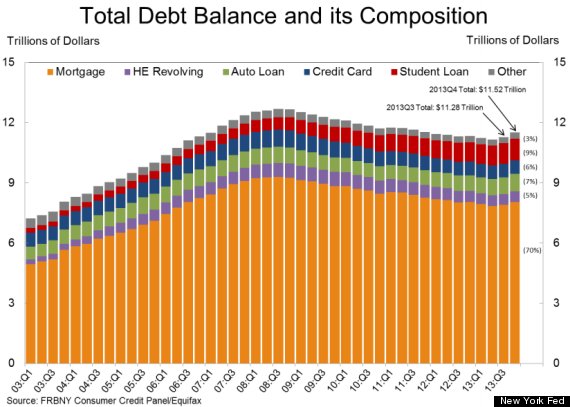
NEW YORK, Feb 18 (Reuters) - U.S. household debt rose in the latest quarter by the most since before the recession, a sign that Americans may be nearing the end of a multi-year belt-tightening trend, data from the Federal Reserve Bank of New York showed on Tuesday.
Total consumer debt rose 2.1 percent to $11.52 trillion in the fourth quarter of 2013 from $11.28 trillion in the third quarter, the New York Fed said in its quarterly household debt and credit report. The increase, $241 billion, marked the biggest quarterly jump since the third quarter of 2007.
Even with the increase, total household indebtedness remains 9.1 percent below its peak of $12.68 trillion in the third quarter of 2008, reflecting the extensive deleveraging by households in the years following the housing market collapse and financial crisis. Nevertheless, the report also marked the first year-on-year increase in household debt since the crisis, perhaps signaling that the deleveraging cycle has run its course.
Americans boosted credit card balances, borrowed to buy homes and cars and took on more student debt. The only major category to see a decline was home equity lines of credit, or HELOCs, which dropped by $6 billion to $529 billion.
"This quarter is the first time since before the Great Recession that household debt has increased over its year-ago levels suggesting that after a long period of deleveraging, households are borrowing again," said Wilbert van der Klaauw, senior vice president and economist at the New York Fed.
Auto loan balances jumped by $18 billion, the 11th straight quarterly increase, although new loan originations fell to $88 billion from $97.4 billion.
Reflecting another U.S. trend, student debt rose again with outstanding balances up $53 billion to $1.08 trillion in the fourth quarter. Delinquency rates dipped, however, with 11.5 percent of loans behind by 90 days or more, down from 11.8 percent in the third quarter.
Overall household delinquency rates dropped to 5.0 percent in the three months to December 31 from 5.3 percent in the third quarter, extending a post-recession trend.

